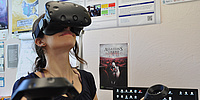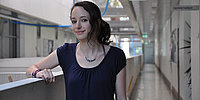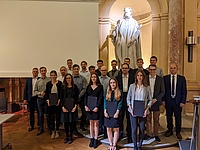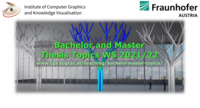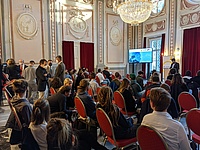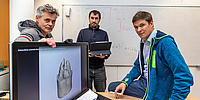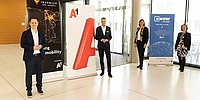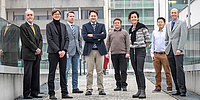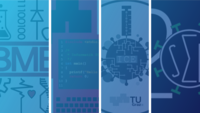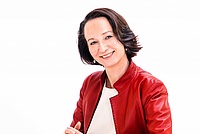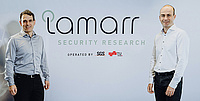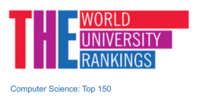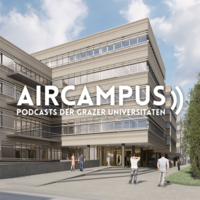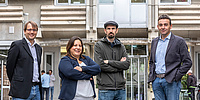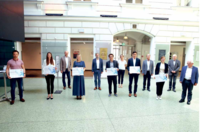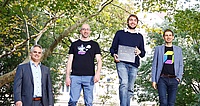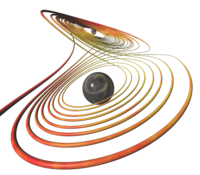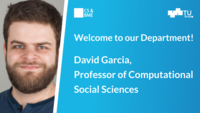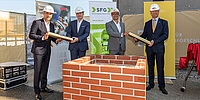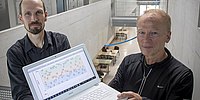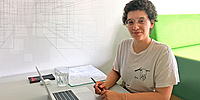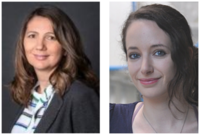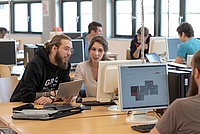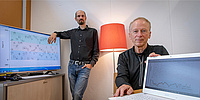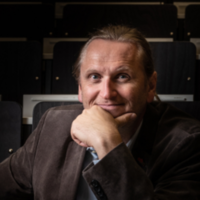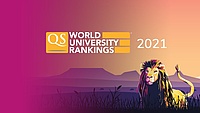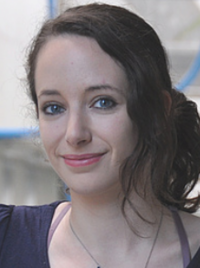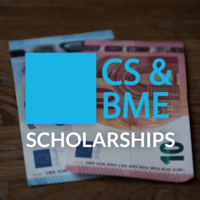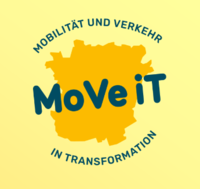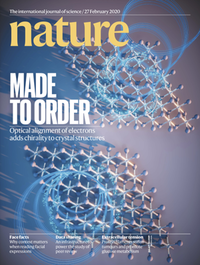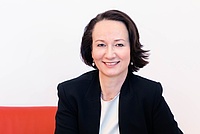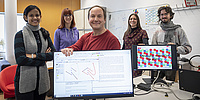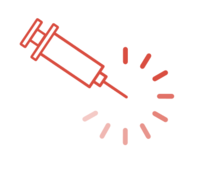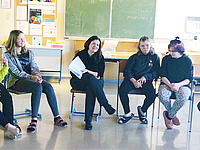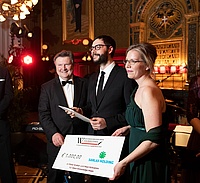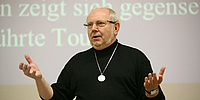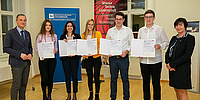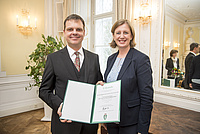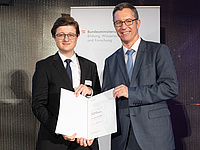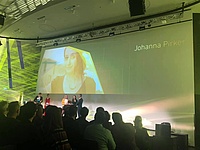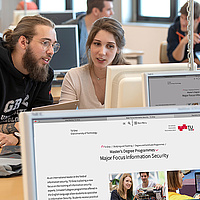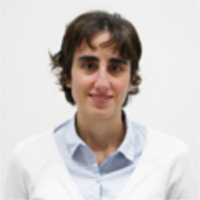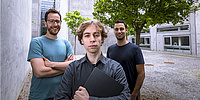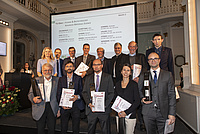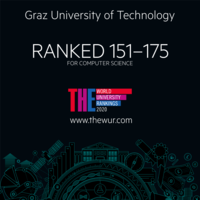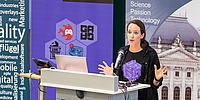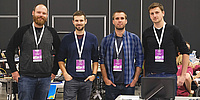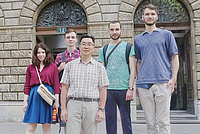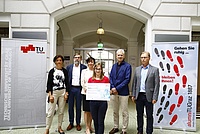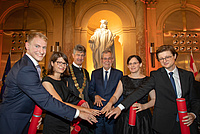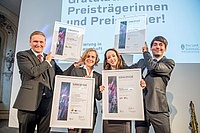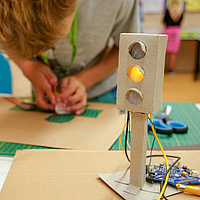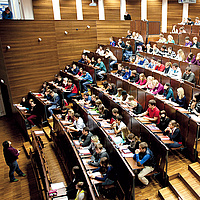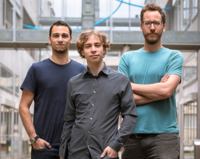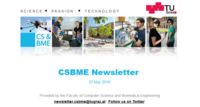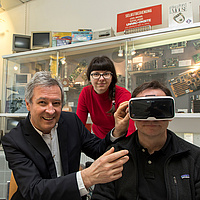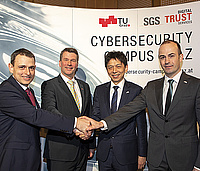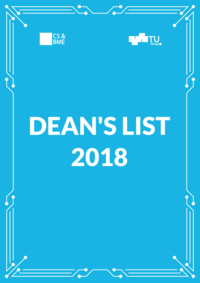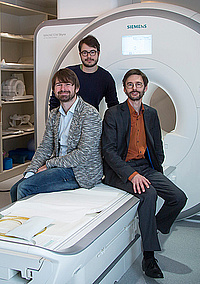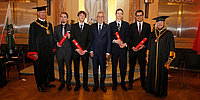
How do burgers taste in the digital world?
February 23th, 2021
McDonald's recently filed ten patents in the USA: The fast food company wants to open virtual stores in the Metaverse. Virtual burgers are to be sold there. It will also be possible to order a real burger delivery for home. More and more companies are active in the so-called metaverse. The buzzword stands for digital worlds of experience that are increasingly merging with reality. Among other things, this development is made possible by improved computing power, which enables ever more realistic applications, in combination with new devices such as data glasses. Mark Zuckerberg is also banking on this. The Facebook group changed its name to Meta a few months ago and is tinkering with a new virtual world.
Even if many have the Facebook logo in mind when they hear the word: "The Metaverse is not something Facebook is inventing," says Johanna Pirker from our Institute of Interactive Systems and Data Science. The concept of the metaverse has been around since the 1990s. Facebook has virtually hijacked the term. Many companies, such as Microsoft, were working on their own versions. "The exciting thing about virtual worlds is that we can do things there that are not possible in reality," Pirker says. For example, you could create historical spaces in learning environments or virtually travel to the moon. In the working world, training with data glasses is just as possible as better communication in the home office. Pirker is already using this. Gather.Town is the name of the application in which her team of 14 has set up a virtual office.
Functioning metaverses already exist. They are called Decentraland or Sandbox. There, people can meet friends, play miniature golf, attend concerts - or shop. Fashion, for example, or expensive real estate. In the metaverse game Sandbox, the luxury label Gucci has bought a plot of land. Adidas is also said to have paid vast sums for a piece of virtual land. Nike ventured a Metaverse advance with a company takeover.
Johanna Pirker sees many opportunities in the metaverse - but also warns of critical developments.
Pirker understands that people spend money on virtual sneakers. "The virtual space is also about individualization. Why do people buy Nike shoes in real life? The reasons go far beyond functionality. And buying behavior is no different in the virtual space." Now is the time to help shape it, he said. For example, to ensure that the metaverse does not become a central system of a single corporation, or that the bad sides of the real thing are carried over into virtual reality. Cases of virtual sexual assault already exist. "And the question is whether we want a real estate bubble there, too."
In any case, real money is bubbling up: big tech companies are pumping billions into development. Not only U.S. corporations like Facebook or Microsoft, but also Chinese giants from Alibaba to Tencent. A study by the market research company Global Industry Analysts puts the global metaverse market at 172 billion euros this year. In 2026, it is expected to grow to 671 billion euros, according to the forecast. So is the metaverse the next big revolution? Or just a big pipe dream, as some critics say?
"Of course, a flop is possible. There was one with a similar project, Second Life," says blockchain expert Alfred Taudes from WU Vienna. Currently, however, several technologies are playing together. The blockchain not only enables the realization of digital worlds, but also its own financing options through cryptocurrencies. The time could be ripe. "I advise companies to try innovations and be present. At the beginning of the Internet, everyone also made a website and didn't know exactly why. But those who innovated at the beginning were more likely to succeed later," Taudes says. Metaverses like Decentraland don't have many residents yet. That could change, partly because of the trend toward NFTs, a kind of certificate of authenticity for digital goods: "If I have them, I want to show them off. And I can do that in the Metaverse."
(Johanna Pirker talked with Salzburger Nachrichten, published on February 22nd, 2022)
Career orientation in virtual space
February 16th, 2021
Showing strengths, arousing interest and ultimately providing employment - these are the goals of career guidance.
In order to better reach young people and prepare them in a targeted manner, the Virtual Reality Studio was created in the Gürtelturm in Graz in spring 2020 in cooperation with the Public Employment Service (AMS) and the Graz University of Technology (TU). With the help of VR glasses and corresponding apps, apprenticeship seekers can get a taste of various industries and companies there.
There are many reasons for using new technology in career guidance, says Johanna Pirker of the Institute of Interactive Systems and Data Science at Graz University of Technology. After all, "Our school system is so rigid, even though technology changes every few months." Young people today live in a fast-paced world with a lot of distractions - the irony, she says, is that "in virtual spaces, it's often easier for them to concentrate because there's no TikTok, no smartphone."
FWF approved:
New Special Research Area "SPyCoDe"
January 24th, 2021
Security and privacy are human rights that should also apply in the digital society. That is why there is also the principle of "Security and Privacy by Design" in the new European General Data Protection Regulation: data protection should be taken into account in the early design phase of IT infrastructures.
Unfortunately, modern technologies are not sufficient to implement this principle, as the numbers of attacks and security breaches show. Without privacy protection, large-scale digitization is not possible. Therefore, it is a research area with extraordinary technological, societal and economic implications.
The special research area "SPyCoDe" aims to create the technological basis for the realization of the principle "Security and Privacy by Design". It aims to create tools for companies to build complex systems that are secure by design and protect privacy due to their components. This research is a cross-cutting computer science topic that combines breakthrough findings in logic, system security, and cryptography.
Under the leadership of Vienna University of Technology, there are also some well-known names from our department: Roderick Bloem, Maria Eichlseder, Daniel Gruss, Stefan Mangard
The SPyCoDE team - all international leading minds in logic, system security and cryptography - will now spend the next four years building a repository of knowledge for teaching, basic research and technology transfer, giving companies access to tools they can use to build complex IT systems that are secure by design and protect privacy. The funding volume for the SFB amounts to 4.4 million euros.
Johanna Pirker @ 7. Wiener Innovationskonferenz
January 19th, 2021
The "7. Wiener Innovationskonferenz" will take place online from January 25th-27th. On the second day, the focus will be on digitalization and changes brought about by the pandemic.
There will be held a discussion called "Innovative Lernmethoden oder Technostress?" with Johanna Pirker (ISDS). The 2021 Heddy Lamarr Award winner for research on innovative learning methods will discuss with business informatics specialist and technostress researcher Rene Riedl (Johannes Kepler University Linz) online on January 26th.
Register now to participate.
Aortic muscle cells in an oblique position
November 18th, 2021
The smooth muscle of the aorta does not wind in the vessel wall in an exact circle, but with a slight slant, reports Gerhard Holzapfel of the Institute of Biomechanics. It was apparently oriented this way in evolution to optimize the biomechanical behavior of the aorta. He and colleagues created a computer model of the three-layered vessel. The study appeared in the Royal Society journal Proceedings A.
A human aorta is composed of three layers, Holzapfel explained. First, there is a matrix layer that has rubber-like properties. Another layer has long protein fibers (collagen layer) embedded in different directions, he said. Third, there is a layer of smooth "slow muscle."
A team led by Holzapfel analyzed these layers with imaging techniques and made complex calculations to simulate their behavior in the computer model. "However, these can be solved very efficiently," the researcher said, adding that this would make it possible to model "with pinpoint accuracy" how the aorta behaves mechanically.
It is striking that the muscle cells of the aorta are not arranged tangentially, i.e., in the direction of the vessel's circumference, as previously believed, but "inclined outward a bit," Holzapfel said: "We don't yet understand why nature has laid them out in this direction, but it is certainly a matter of functional optimization and the best possible alignment."
Archaeological search engine from Graz
November 09th, 2021
Archaeology no longer uses only shovels, spatulas and brushes. Magnetometers and ground penetrating radar systems are also part of their modern toolbox. But how can clay shards from Carnuntum be compared with those from Pompeii?For tasks like these, Tobias Schreck and his team are developing an archaeological search engine as part of the FWF Project CrossSAVE-CH.
Read more about the project here.
Listen to the interview at "ORF Radiothek" (german) here.
Algorithms for responsible resource allocation
October 28th, 2021
A research group including Viktoria Pammer-Schindler from our Institute of Interactive Systems and Data Science publishes a paper on the use of AI for a responsible distribution of resources.
How can scarce goods be best used for the benefit of as many as possible? This question leads to the allocation problem. It is as old as humanity itself. Two examples of this are being publicly discussed in Austria: One is the automated classification of job seekers as a basis for the release of subsidies, also known as the "AMS algorithm." The other is the assessment of the survival chances of patients with life-threatening courses of Covid-19 for the allocation of intensive care beds - called "triage". In both cases, algorithms support experts in making informed decisions about resource allocation.
In order to find out which moral problem areas exist in the two examples, it is helpful to conduct a systematic investigation. For this purpose, the sociotechnical reflection framework SREP was developed by researchers in Graz. It aims to guide the design of responsible AI applications. It reflects on relevant human-machine interactions during the development and use of algorithmically supported systems against the background of ethical building blocks and identifies potential problems.
Read more in Falter 43/21 - Heureka 6/21.
Johanna Pirker was awarded the "Hedy Lamarr Preis"
October 19th, 2021
Johanna Pirker, head of the "Game Lab" research group, was awarded the Hedy Lamarr Prize of the City of Vienna. Pirker's research covers the topics of Artificial Intelligence, Virtual Reality, Games and Human-Computer Interaction, she also deals with the fields of energy research, urban planning and medicine.
Faculty Day with Inaugural Lecture of David Garcia Becerra
October 14th, 2021
Our Faculty Day took place in at the "Aula Alte Technik". After an short introduction of the Vice Rector Horst Bischof, several tenure track professors gave insights into their research. Before David Gracia Becerra started his interesting inaugural lecture, our Dean´s List Ceremony was held with representatives of each study program and year.
Announcement of topics for bachelor and master theses in winter term 2021/22
With the new winter semester coming up, we are announcing current topics for Bachelor and Master theses in the areas of Computer Graphics, Geometry Processing and Visual Analytics, supported by the Institute of Compute Graphics and Knowledge Visualization together with Fraunhofer Austria
Inauguration Lecture of the new Master´s Computational Social Systems
October 11th, 2021
The Kick-Off Event for the new Master´s Computastional Social Systems took place in a full "Meerscheinschlössl". David Gracia Becerra, Prof. for Computational Behavioral and Social Sciences, led throughout the event. After an short introduction of the two rectors of the two universities of graz, digital guests from the ministery, from science and from industry congratulated the participants of the new program. After that, a joint statement from Elisabeth Lex and Stefan Thalmann, the Deans of Study, was helt. This was followed by a guest lecture by Prof. Dr. Aniko Hannak (University of Zurich) on "The New Faces of Bias in Online Platforms". After an extended, interesting discussion, the Science Talk continued over a buffet. All in all it was a very successful event.
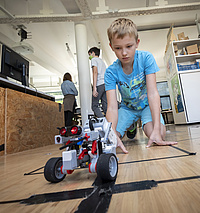
Success: "Robotik-Forschungswoche"
September 29th, 2021
Children were able to demonstrate their programming skills in the robotics lab during the summer months. The children receive their robots at the beginning of the week and are slowly introduced to the world of programming. Even at a young age, he said, it is thus possible to promote analytical thinking. "Of course the kids are given certain guidelines. For example, every day they have to complete certain challenges with their robots every day. But if something doesn't work out right away, they should feel free to tinker a bit, and we'll help them find the problem," Manuel Menzinger from our Institute of Software Technology explains. The feedback from the children, who, of course, don't experimenting all day but are also supervised by "Kinderbüro" staff during breaks, is very good.
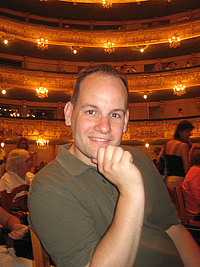
Accurate and efficient time-domain classification with adaptive spiking recurrent neural networks
September 14th, 2021
Inspired by more detailed modeling of biological neurons, Spiking neural networks (SNNs) have been investigated both as more biologically plausible and potentially more powerful models of neural computation, and also with the aim of extracting biological neurons’ energy efficiency; the performance of such networks however has remained lacking compared to classical artificial neural networks (ANNs). Here, we demonstrate how a novel surrogate gradient combined with recurrent networks of tunable and adaptive spiking neurons yields state-of-the-art for SNNs on challenging benchmarks in the time-domain, like speech and gesture recognition. This also exceeds the performance of standard classical recurrent neural networks (RNNs) and approaches that of the best modern ANNs. As these SNNs exhibit sparse spiking, we show that theoretically they are one to three orders of magnitude more computationally efficient compared to RNNs with comparable performance.
Together, we argue that this positions SNNs as an attractive solution for AI hardware implementations.
Speaker:
Prof. Dr. Sander M. Bohté
Location:
Seminarraum IGI - Inffeldgasse 16b/I
Webex
When:
Friday, 17 September 2021 11.00 – 12.45
Organizer:
IGI TU Graz

AI-DA Challenge - Award ceremony
August 09th, 2021
Big thanks to the 8 teams of TU Graz for their engagement in the AI-DA Challenge (AI-Dependability Assessment) of Siemens Mobility in the last weeks.
“What was so interesting about this task is that it wasn’t only about reaching as high accuracy as possible but also required us to consider real-world safety aspects. For example, we made trade-offs between different kinds of errors and gave bounds to our misclassification rates, so the model could actually be used in a safety-critical environment,” Patrick Deutschmann and his team partner Lukas Timpl stated.
Due to this strong participation of our TU Graz, the jury decided at the award ceremony on 16 July to increase the prize money and to award three out of eight teams from TU Graz with the Runners-up prize of € 1000 for each team:
- Adna Ribo | Markus Schiffermueller | Lucas Weitzendorf
- Felix Muetter
- Patrick Deutschmann | Lukas Timpl
Furthermore, the CKI office at TU Graz and Siemens Mobility Graz would invite all 8 teams to pizza and beer at the beginning of the next semester, please contact christine.schichler@tugraz.at .
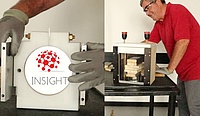
DIY tabletop magnetic resonance scanner
July 19th, 2021
The student initiative INSIGHT, operating at our Institute of Medical Engineering, introduces itself with an exciting project: Self-construction of a magnetic resonance tomograph for the desk. They broadcast live the assembly of the core piece, namely the magnet system for the small scanner. This is an assembly of iron yoke, pole pieces and two extremely strong neodymium permanent magnets. The assembly is relatively spectacular, as forces of up to one and a half tons act on the parts in the meantime and therefore great caution, some securing and some courage are required during assembly. The team of four students has been eagerly awaiting this moment for a year and wants to share the exciting scenes with all viewers. Live on YouTube: July 22th - 3pm
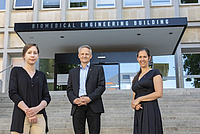
The World's First Digital Model of a Cancer Cell
July 06th, 2021
Computer models have been standard tools in basic biomedical research for many years. However, around 70 years after the first publication of an ion current model of a nerve cell by Hodgkin & Huxley in 1952, researchers at Graz University of Technology (TU Graz), in collaboration with the Medical University of Graz and the Memorial Sloan Kettering Cancer Center in New York, have finally succeeded in developing the world's first cancer cell model, thus launching "an essential tool for modern cancer research and drug development," reports a delighted Christian Baumgartner. The head of the Institute of Health Care Engineering with European Testing Center of Medical Devices at TU Graz is senior author of the publication in which the digital model is presented in the journal PLoS Computational Biology.
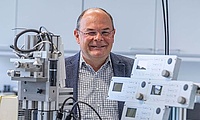
One award after the other for Gerhard Holzapfel
June 09th, 2021
Biomechanist Gerhard Holzapfel can be pleased about two new science awards. His computer simulations are intended to facilitate medical prognoses.
Holzapfel can be pleased about another award. After the William Prager Medal (we reported in January), he received the next international medal: the Koiter Medal, awarded for special achievements in research and science. In addition to American scientists from renowned U.S. universities, Holzapfel is an Austrian among the list of award winners. "This is already a great honor," says the 60-year-old professor, who was already awarded the Erwin Schrödinger Prize ten years ago for his life's work.
Holzapfel's focus: the calculation of mechanical properties for vessel walls, such as an aorta or artery. He has developed his own model for this purpose. "You can map mechanical processes that happen in our body on the computer. The finer the model, the more accurate the prediction. On the virtual patient, you can thus predict what a medical intervention will be like," he explained to Kleine Zeitung. "We can make simulations that are very close to reality. That's where technology has advanced insanely."
Holzapfel began his career as a young postdoc at Stanford. "In America, there was already a lot of research going on in the field in the early 1990s, so I was there at the right time." In the meantime, he himself is the contact person for 200 students and drives countless projects forward. The TU Graz lead project "Aortic Dissection" has just been extended. This involves working on computer simulations of aortic dissections. An aortic dissection is a splitting of the wall layers of the aorta. This condition can be life-threatening. The aim of the TU project is to use algorithms and models to support diagnosis and treatment at an early stage.

Data register and data protection very well compatible
May 25th, 2021
New encryption methods ensure the pooling of sensitive income and health data at a very high level of data protection. It is precisely for such cases that research has developed technologies that are ripe for practical use.
In the course of the current discussion about a planned data registry for times of crisis such as pandemics, which is viewed critically by data protection experts, cybersecurity expert Christian Rechberger of Graz University of Technology takes notice: "Pandemic management using merged income and health data is very much possible with the required level of data protection. Together with international colleagues, we have developed new cryptographic methods since the beginning of the pandemic that will be used for such applications, among others."
Rechberger sees the crisis database as a classic case for the first use of the new technology. This is based on so-called homomorphic decryption: it allows confidential data to be processed and interleaved without first having to be decrypted. "This allows data registers to be implemented while maintaining privacy and protecting sensitive, personal data. No data source has to copy the data elsewhere, registers do not have to be merged centrally. The data remains local, and the calculations are encrypted. Only the result of the respective study is then disclosed."
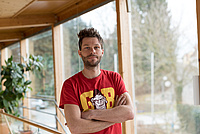
"In the future, we will have to adjust consumption to supply, not the other way around"
May 22th, 2021
Responsibility for the climate and the environment should not be assigned to the individual, emphasizes Gerald Schweiger. "This requires technological solutions at a systemic level." The fact that the 35-year-old, who conducts research on intelligent energy systems at the Graz University of Technology (TU), sometimes digresses into socially critical and philosophical considerations may be due to his education: "After HTL, I actually thought that technology wasn't for me after all, and initially followed up with studies in philosophy and social sciences. In the end, however, I only added another engineering degree and one in environmental systems science."
The result is not only a total of four academic degrees in the passport around his name in his passport (the fifth will follow soon), but also holistic demands such as these demands like this: "One less plastic bag is not a solution. We have to rethink entire systems and equip them with intelligence. Especially in the area of sustainability new insights have an enormous impact."
Gerald Schweiger (35) is concerned with energy systems of the future and their optimization with the help of physical models and artificial intelligence. He teaches at Graz University of Technology, where he heads the "Intelligent Energy Systems" research group, as well as at two Styrian universities of applied sciences. In addition, Schweiger leads several national and international projects on the topic.

Hellomath: TU Graz student founded learning platform for math school-leaving exam
April 06th, 2021
Calculating probabilities, uncovering the value of X, analyzing graphs - math is a nightmare for some students.However, for students Maximilian Mallweger and Matthias Hülse rmath is passion. "Yes, it exists!" they write on their website Hellomath - the self-founded learning portal where students can prepare for the centralized math Matura.
The tasks that can be solved on Hellomath are taken from the official question pool of the Ministry and also from older maturity exams that are freely available. Maximilian has also created some tasks himself, based on basic competency schemes. Already 100 active users use the learning portal regularly.

Mobile app generates data for the energy management of the future
March 24th, 2021
As part of the GameOpSys research project, people were asked to document their own energy consumption using a study app. Researchers at TU Graz use this data for modeling and optimizing future energy systems.
The research group "Intelligente Energiesysteme und Cyber-Physical Systems" at the Institute of Software Technology at TU Graz is working on methods to make energy systems more efficient and intelligent, while also taking into account the interaction between humans and technology. In collaboration with simulation expert Niki Popper and his company dwh, the Graz-based research group led by Gerald Schweiger focused on necessary technologies for future user-centered energy services. For this purpose, a mobile app was developed that is intended to motivate users with game-like elements (gamification) to collect data on their own energy consumption (electricity, heating and cooling).

"Software development is much more than just programming"
March 16, 2021
Denis Helic explains why Software development is much more than just programming. Software development does not only include programming skills, but also requires management and team leadership skills. User experience is also becoming increasingly important. The curricula are continuously updated and expanded via electives in order to respond to new developments. That's why the TU has offered an English-language bachelor's and master's degree in software engineering and management since 2005, where 20 percent consists management topics. Helic explains that the profession demands a range of soft skills, "from project management to teamwork to communication skills and much more." In addition, he says, today's students are tomorrow's company founders, designing and marketing their own products in the software field. This refutes the stereotype of the computer scientist tapping away in a lonely chamber.
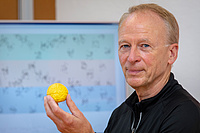
New approach found for energy-efficient AI applications
March 11, 2021
Computer scientist Wolfgang Maass and his doctoral student Christoph Stöckl have found a new design method for artificial neural networks. These networks get by with extremely few signals. Similar to Morse code, they also give meaning to the pauses between the signals. Maass and Stöckl were inspired by the way the human brain works. The human brain processes several trillion calculations per second, but only needs about 20 watts to do so. This low energy consumption is made possible by inter-neuronal communication using very simple electrical impulses, so-called spikes. This research work is anchored at TU Graz in the Fields of Expertise "Human and Biotechnology" and "Information, Communication & Computing", two of five areas of strength at TU Graz.
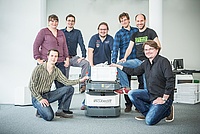
Styrian robotics specialist is bought up by US group Verizon
February 16, 2021
Incubed IT, a start-up founded in 2011 by seven graduates of TU Graz, is being bought by the US company Verizon (2020: $128.3 billion sales). The founders got together back in 2004 when they first formed a TU team for the Robocup. In 2011, the seven graduates of TU Graz (Julia Arnus, Stephan Gspandl, Reinhard Günther, Andreas Hechenblaickner, Michael Reip, Mate Wolfram and Christoph Zehentner) founded Incubed IT. They recently achieved annual sales in the low millions, and have already received many awards, including the "Phoenix" founder prize, the "Robotics Award" at the Hanover Trade Fair, and the Fast Forward Award.

More privacy for using WhatsApp and Co.
February 15, 2021
Two of our cryptography experts Daniel Kales and Christian Rechberger developed, together with their colleagues at Darmstadt University of Technology, privacy-protecting security software for mobile messenger services. "ContactGuard" was awarded the 8th German IT Security Award 2020. The researchers intend to use the prize money of 60,000 euros to further develop the security software to market maturity. Stay ahead!

Promotion Award 2021 of the Forum Technology and Society
Febuary 10, 2021
You completed your disseration or master thesis between February 1, 2020 and January 31, 2021? Briefly argue (3000 characters) why your dissertation or master thesis is or can be important for society. Send your arguments and convince the jury. The prize money totals 12,500 euros this year!

Martin Ebner is honored as "Styrian of the day"
02. Febuary 2021
Martin Ebner was portrayed in the Kleine Zeitung because of his development IMooX, which is an Austria-wide platform where digital teaching content of higher education institutions is managed. Ebner has been involved with digital forms of teaching and learning for more than 20 years now.
Cardiovascular diseases: New "Digital Twin" computer model improves therapy
January 22, 2021
Although treatment options are constantly improving, cardiovascular diseases are still one of the most frequent causes of death in Europe. The success of the treatment varies from patient to patient and depends on the individual pathology. Gernot Plank (Med Uni Graz) has now developed a computer model together with the mathematicians Gundolf Haase and Kristian Bredies from the University of Graz and computer scientist Thomas Pock from the Institute of Computer Graphics and Vision at Graz University of Technology, respectively, with which doctors can pre-simulate the optimal therapy and dramatically improve the success of treatment.
Gerhard A. Holzapfel receives William Prager Medal 2021
January 18, 2021
Prof. Holzapfel receives the prestigious prize for his outstanding contributions to the inspirational application of solid mechanics in the development of continuum theory, computational methods, simulation and experiment in the biomechanics of soft biological materials. Congratulations!
A1 Telekom Austria acquires majority stake in analytics start-up Invenium
January 14, 2021
By acquiring a majority stake in the Graz University of Technology spin-off and the Know-Center, A1 is expanding the area of movement data analyses and offering "A1 Mobility Insights", a commercial product based on the TÜV-approved and data protection-compliant platform.
Adaptive, automated, interactive: research group develops future health portal
December 22, 2020
Researchers from TU Graz, Med Uni Graz and Uni Graz are working on a digital interactive information system that automatically tailors medical content to individuals and their needs. Can this digital system make predictions about the individual information needs of users, recognize their cognitive abilities, and use this data to convey high-quality medical content in a comprehensible and clear manner? If Tobias Schreck, head of the Institute of Computer Graphics and Knowledge Visualisation, has his way, such a system will be a reality in four and a half years at the latest. At least, that is the schedule of the research group that Schreck initiated together with Andrea Siebenhofer-Kroitzsch, head of the Institute of General Medicine and Evidence-Based Health Services Research at the Medical University of Graz, and Dietrich Albert, head of the Cognitive Science Section at the Institute of Psychology at the University of Graz. Funded by the Austrian Science Fund FWF, the scientific teams of the three institutes are working across disciplines to implement an interactive and adaptive health information system.
New logos designed by our first year students
December 09, 2020
For the first time this year, we challenged our first semester students to design a logo for their respective study programme. We had a lot of great entries, but unfortunately only one could be chosen per programme. The best ones were also printed as stickers. Congratulations to the winners of 2020!
Stefanie Lindstaedt chosen as one of the most influential women in Technology 2020
01 December 2020
Stefanie Lindstaedt has been chosen as one of the ten most influential women in Technology 2020 by the renowned ‘Analytics Insight’ magazine in their November issue. The magazine did a special feature on the ten most influential women in Technology. The article highlights the need for women in Technology and throws light on how these women leaders have laid their paths and surged ahead towards their goals with perseverance.
Key Competencies Certificate "Entrepreneurship – Entrepreneurial Acting and Thinking"
December 01, 2020
Basic (16 ECTS) and Advanced (16 ECTS)
Starting in winter semester 2020/21, there is a way to prove key competencies by Certificates issued by Graz University of Technology - for example, by the structured use of course offerings around the topic of entrepreneurship. In a good mixture of theory and practical offers you will gain valuable experience for initiating, designing and implementing your own (start-up) projects. If you have been interested in the topic for some time, you may already have completed some of the courses anyway - then there is not much missing to obtain the certificate and it is especially worth looking at the list!
SGS and TU Graz open Lamarr Security Research
17 November 2020
Cybersecurity is one of the biggest challenges for our information society and there is urgent need to fundamentally rethink the way systems are built, composed and analyzed. In order to enable trust and to create a world where data security and privacy are a matter of course, it is necessary to perform open research on novel technologies. Non-profit Lamarr Security Research is the new centerpiece of the international Cybersecurity Campus Graz, opened by SGS and TU Graz in 2019 (press release from 2019). Research results will become available to all, bringing high value to society.
PLATYPUS: New vulnerabilities discovered in Intel processors
10 November 2020
Together with international colleagues, CISPA researcher Michael Schwarz and the TU Graz computer scientists Daniel Gruss and Moritz Lipp present PLATYPUS attacks: a method that allows power side-channel attacks even without physical access. Power side-channel attacks are attacks that exploit fluctuations in power consumption to extract sensitive data such as cryptographic keys. Because power measurements with a malware were previously too inaccurate, such attacks required physical access to the target device and special measurement tools such as an oscilloscope.
THE World University Rankings 2021: TU Graz moves up again from 151-175 to 126-150!
03 November 2020
The Times Higher Education World University Rankings 2021 includes almost 1,400 universities across 92 countries, standing as the largest and most diverse university rankings ever to date.
We are happy to announce that we have been ranked 126-150 in the computer science category, up from 151-175! Sincere thanks and congratulations to all our outstanding scientists who make such a great achievement possible through their daily dedication!
Nominations for the Styrian PR Panther 2020 - Vote now!
02 November 2020
Johanna Pirker (ISDS), Stefanie Lindstaedt (ISDS, Know-Center) and the Cybersecurity Campus Graz are nominated for the Styrian PR Panther 2020. You can vote for your favorite once a day until 09 November!
The Topography of Family History
28 October 2020
Reinhold Preiner (CGV) actually only wanted to explore his ancestry. But when his family tree included about 400 people, he realized that the presentation became incredibly confusing. So he researched a completely new way of visualizing genealogical data. He presented the result this year at Eurovis, and you can find an article on his research on DerStandard.at.
AirCampus Podcast: A roof for all data
28 October 2020
TU Graz is getting a new building: The "Data House" is to become the new hot spot for innovations in the field of digitization from summer 2022. The focus will be on data-driven business, big data analytics and artificial intelligence.
Visionary research on ultra-fast information processing
28 October 2020
Ultra fast, safe and energy-saving: The increasing demands on data processing increase the need for high-speed, real-time and low-energy calculations. This also requires completely new hardware concepts. In the new FET Open project ADOPD, the participating research groups are developing ultra-fast computing units based on optical-fibre technologies that function according to the principles of information processing in the brain. Robert Legenstein (IGI) explains: "Such information processing takes place in our brain, namely by neurons in their tree-like (dendritic) branches. This dendritic information processing is highly compressed, runs in parallel and also enables non-linear calculations. And we want to transfer this to novel computer hardware."
Pocket Code among 20 finalists for the Huawei HMS App Innovation Contest - Vote now!
28 October 2020
Pocket Code teaches and allows to create apps using a fast game physics engine and all the phone's sensors including the camera for AR- and AI-based games. Please vote and support a great project by Prof. Wolfgang Slany and more - you can win a 25$ Amazon Gift Card! You can vote up to 3 times per day.
Sponsorship prize of the Forum Technik & Gesellschaft awarded for the best Master's and Doctoral theses
20 October 2020
Theses with social relevance are the focus of the prize, which has been awarded annually by the Forum Technik & Gesellschaft since 2003. In 2020, five master's theses and six dissertations were presented online in the final round. The first place went to Martin Schwarzl for his Master's thesis "NetSpectre" for proving that attacks on the intermediate memory of processors succeed not only on devices on site, but also over the network. The third place to Patrick Ofner for his work on low-frequency brain waves in Brain-Computer-Interface applications. A special prize was awarded to Barbara Gigerl, whose master's thesis examined how the concept of transfer entropy can be used to identify influencers in social networks. Congratulations to all!
Dynatrace Scholarship worth 12.000€ awarded to Anton Klinger
20 October 2020
At this year's CSBME Faculty Day, the Dynatrace scholarship worth 12.000€ was awarded for the first time. The computer science student Anton Klinger received the merit scholarship for the two-year Master's program from Dean Roderick Bloem and Chris Werding, head of the Graz Dynatrace site. His plans: "I work on a 10-year-old notebook. Now I can finally buy a new PC," Klinger explained at the presentation of the scholarship. The 25-year-old also wants to invest in his great passion, the development of computer games. His biggest and most promising project is the action game Pixel Soldier. Congratulations, Anton!
Dean's List 2020 - Representatives awarded
20 October 2020
The CSBME Dean's List exists since 2018. With the inclusion in this list, we want to honor the best students of our Bachelor's degree programs. The list features the top 5% students of each class (each combination of study program and semester). At the CSBME Faculty Day, the representatives received a certificate from Dean Roderick Bloem and Vice Rector Stefan Vorbach to commemorate their outstanding achievements. Congratulations!
CGV Announcement of topics for bachelor and master theses in 2020/21: Slides, videos, and Webex Q&A sessions
06 October 2020
With the new winter semester coming up, we are announcing current topics for Bachelor and Master theses in the areas of Computer Graphics, Geometry Processing and Visual Analytics, supported by the Institute of Compute Graphics and Knowledge Visualization together with Fraunhofer Austria. We have published the slides and videos on the topics, as offered from our supervisors.
We will also host a live question and answer session on Friday, October 09, 11-12am on Webex. Each supervisor will be available in her/his conference room. Both can be accessed (only from the TU Graz LAN/VPN) here.
If you have any questions, and wish to get in touch with the advisors of the topics, please feel free to join the Webex session, or contact the advisors directly via the contact information in the videos and slides.
New professor: David Garcia joins our Faculty
01 October 2020
We are excited to announce that David Garcia has joined our faculty as a Professor of Computational Social Sciences! He is now part of the Institute of Interactive Systems and Data Science. A very warm welcome to TU Graz!
New service for students: Dean's Office on Discord!
29 September 2020
We at the CSBME Dean's Office want to expand our consulting services and make them available to you online. For that reason, you can now reach us on Discord during office hours! To use this service, use the link above and switch to the voice channel when you see us online. We are happy to help you with your study related problems in a modern way, save you from tedious typing, and to get in touch with you personally. See you on our server!
ICG is part of the iLIDS4SAM consortium
15 September 2020
iLIDS4SAM is a flagship project for Austria´s future in automated mobility. Automated mobility systems are presently moving towards more complex urban traffic scenarios. The FFG-funded iLIDS4SAM project will enable this transition by developing high performance, low-cost LiDAR sensors with increased field of view and resolution. The Institute of Computer Graphics and Vision develops the algorithms for interpreting the LiDAR point clouds and assessing the semantic meaning of the acquired data.
Foundation Stone laid for two new research centres at TU Graz
14 September 2020
Addition to Campus Inffeldgasse: on 14th September 2020, the foundation stone for the new Data House and SAL building (Silicon Austria Labs building) was laid at Campus Inffeldgasse of Graz University of Technology (TU Graz) in the presence of TU Graz Rector Harald Kainz, Mayor Siegfried Nagl, SFG Managing Director Christoph Ludwig and Hans-Peter Weiss, CEO of the Federal Real Estate Company (BIG). The two buildings are being constructed on an 8,800 m2 site in Sandgasse. Together they offer around 20,000 m2 of net space. The investment volume is around 55 million €. The completion of the buildings is scheduled for July 2022 (Data House) and January 2023 (SAL building).
New learning algorithm should significantly expand the possible applications of AI
14 July 2020
The high energy consumption of artificial neural networks' learning activities is one of the biggest hurdles for the broad use of Artificial Intelligence (AI), especially in mobile applications. Robert Legenstein and Wolfgang Maass (Institute of Theoretical Computer Science) developed the e-prop learning method that forms the basis for drastically more energy-efficient hardware implementations of AI.
AutoDrive: New simulation scenarios should help to make autonomous driving even safer
14 July 2020
(Partially) autonomous cars are already on our roads today with automated systems such as braking or lane departure warning systems. As a central vehicle component, the software of these systems must continuously and reliably meet high quality criteria. Franz Wotawa and his team from the Institute of Software Technology in close collaboration with the cyber-physical system testing team of AVL are dedicated to the great challenges of this future technology: the guarantee of safety through the automatic generation of extensive test scenarios for simulations and system-internal error compensation by means of an adaptive control method.
IAIK is part of the KRAKEN Project
14 July 2020
KRAKEN (BroKeRage and MArKet platform for pErsoNal data) is developing a trusted and secure personal data platform with state-of-the-art privacy aware analytics methods (with guarantees on metadata privacy, including query privacy). The Institute of Applied Information Processing and Communications (IAIK) brings to the KRAKEN project experience & expertise in identity solutions (WP2), self-sovereign identity & eID/eIDAS (WP3), and cryptography & privacy (WP4); and is also involved in the education pilot (WP5).
Planet Research: Young researchers making the Internet of Things safer
14 July 2020
Eleven young researchers are working as doctoral students or post-docs in the TU Graz lead project "Dependable Internet of Things in Adverse Environments” – “Dependable Things” for short. The six-year project aims to make our increasingly networked world safer and more reliable. To this end, it examines the individual smart objects in the Internet of Things under harsh environmental conditions and then develops them further. One of these researchers is Andrea Pferscher (Institute of Software Technology).
Face to face: "Programming is like reading a good book"
14 July 2020
Naomi Pfaff changed from psychology to computer science studies at TU Graz. For her bachelor’s thesis she designed a tutorial game with learning tasks in particular areas of mathematics and programming, especially for female teenagers.
Vesna Krnjic and Johanna Pirker nominated for Hedy Lamarr Prize 2020
30 June 2020
The Hedy Lamarr Prize of the City of Vienna has been awarded annually since 2018 to an Austrian researcher for her "outstanding achievements in the field of information technologies". Krnjic (IST) was nomitaded for her work on interaction between computers and youths, and Pirker (ISDS) was nominated for her work on game theoretical interactive learning systems. Congratulations!
New Master's Curricula for Computer Science and Software Engineering
23 June 2020
The new Curricula will come into effect on 01 October 2020. You can watch a presentation on all changes by your student representation on YouTube.
New approach for a biological programming language
23 June 2020
Researchers led by Wolfgang Maass and Robert Legenstein (IGI) have succeeded in modelling the emergence and interaction between neuron groups called "assemblies". These are neuron groups in the brain that form the basis for higher cognitive abilities such as thinking, imagining, arguing, planning or speech processing. This could lead to efficient new AI methods.
Johanna Pirker's Story on YouTube
16 June 2020
Johanna Pirker tells the story of how she became a passionate researcher and assistant professor at TU Graz. What's your story?
TEDx Talk by Gernot Müller-Putz now on YouTube
16 June 2020
Making the Paralyzed Move. was the title of Müller-Putz's talk at TEDxTUWien. You can now watch and share it via YouTube.
QS World University Ranking 2021: TU Graz moves up from #311 to #275
16 June 2020
In the 17th edition of the ranking of the international university analysts QS Quacquarelli Symonds, Graz University of Technology manages to advance 36 places. Congratulations to all our amazing and dedicated researchers!
TEDx Talk by Johanna Pirker now on YouTube
09 June 2020
It's not just a game. It's a game changer. was the title of Pirker's talk at TEDxLend. You can now watch and share it via YouTube.
Merit Scholarships and Promotional Scholarships by our Faculty for 2019/20 now available.
28 May 2020
Merit Scholarship call in DE / EN.
Scholarship Grant call in DE / EN.
TU Graz IT Summer Workshops 2020 for kids and teenagers
27 May 2020
Use your summer holidays to tinker, build and program together with experts at Graz University of Technology. A wide range of offers for beginners and advanced students between 10 and 19 years of age are waiting for you! The courses will be held in summer 2020 in compliance with all necessary COVID-19 hygiene and conduct rules.
New online campaign "UNInteressant?" highlights the importance of science for society
26 May 2020
"Take a look at what is being researched at Austrian universities and what this has to do with your everyday life." That is the motto of the project of the Austrian University Conference (uniko). UNInteressant? shows with which projects and research results the Austrian universities are constantly improving our everyday life. Our Faculty is featured with mind-controlled prostheses (MoreGrasp) and drones as postal carriers.
MoVe iT Mobility Plan for Graz 2030
19 May 2020
A team including Günter Getzinger (ISDS, STS Unit) presented their vision for active mobility in Graz. They postulated twelve demands for quieter residential areas, more space for pedestrians, cyclists and a categorisation of the road network that ranges from large scale / supra-regional accessibility to small-scale regional development.
Michael Schwarz (IAIK) receives EuroSys Roger Needham PhD Award 2020
05 May 2020
The EuroSys Roger Needham PhD award is an annual prize awarded to a PhD student from a European University whose thesis is regarded to be an exceptional, innovative contribution to knowledge in the systems area. The prize is donated by Microsoft Research Cambridge. Michael Schwarz received the Award for his thesis "Software-based Side-Channel Attacks and Defenses in Restricted Environments". Congratulations!
Tony Ross-Hellauer published in Nature
29 April 2020
Tony Ross-Hellauer (ISDS, Know-Center) has co-authored two opinion articles that have been published in the renowned 'Nature' journal in recent weeks. The first, a commentary paper on creating an infrastructure to study peer review and, was even featured as the cover in February issue. The second a correspondence piece on predatory journals.
Comment: Big Data for the Greater Good
24 April 2020
Stefanie Lindstaedt (Head of ISDS and Know-Center) was interviewed by Kleine Zeitung on the topic "Less privacy for more disease protection", where she talks about converting the "Symmetry of Ignorance" between data experts and legal experts into a cooperation and more.
Joint statement demands respect for Corona app users' privacy
22 April 2020
Contact tracing apps notify people if they had contact with a person infected with COVID19. Scientists around the world, including Stefan Mangard, Christian Rechberger and Daniel Gruss of IAIK, have now signed an open letter demanding this should not become a surveillance tool to be abused later.
Portrait: Researcher of patterns in the large text of DNA
22 April 2020
Leila Taher searches a "strange text" of three billion letters for patterns that define us as human beings. The TU Graz bioinformatician reads the human genome – and loves unanswered questions. As a biotechnology student in Argentina, Leila Taher wanted to find the one formula that would explain everything. Today she is head of the Institute of Biomedical Informatics at TU Graz.
Planet Research: In search of the foundations of discrete mathematics
21 April 2020
Oswin Aichholzer is head of the research group "Discrete and Computational Geometry" at the Institute of Software Technology. Their findings on fundamental mathematical and geometrical problems were, for instance, used by researchers at MIT to solve well-known problems in origami theory to fold stents.
QS World University Ranking: Our department went up
21 April 2020
The new QS WUR 2020 is out. TU Graz went from rank #363 in 2019 to rank #311 worldwide. In the subject ranking "Computer Science and Information Systems", we went from rank #251-300 to rank #201-250. A big Thank You to all our great researchers who made this possible through passion and dedication!
Talking about: Life as a researcher and everyday life in the time of coronavirus
15 April 2020
TU Graz computer scientist Johanna Pirker reports on whether and how the measures to contain the corona virus have changed her everyday work.
"In computer science in particular, we can carry out a large part of our research outside the office. In our Game Lab we develop and research games and virtual reality environments. Without the appropriate hardware, this is currently somewhat more difficult, and study programmes with students, for example, are also difficult to carry out. So we’re using the time and quiet to finally process and write down data from past experiments and prepare new ones. Everyday life itself has hardly changed."
TU Graz spin-off Invenium helps understand people's mobility patterns
07 April 2020
Using anonymized mobile phone data, researchers can draw conclusions about mobility behaviour, derive traffic patterns and develop new traffic and mobility concepts for cities and regions. Their software-based monitoring system analyses movement flows and supports emergency organizations at major events in order to identify location-specific safety-critical situations in good time. In the fight against the coronavirus, the Austrian government is now also relying on Invenium analyses: "The crisis team can see at the push of a button whether the initial lockdown restrictions are being complied with and how mobility behaviour is changing as a result of COVID-19.", says co-founder Michael Cik.
Bachelor programme timetables coordinated by the CSBME Dean's Office now available
31 March 2020
For better planning, the timetables of the Bachelor programmes Computer Science, Software Development and Business Management and Information and Computer Engineering are now coordinated by the Dean's Office and are available on TU4U.
Competence field Neuromorphic Computing established with help of TU Graz
24 March 2020
Prof. Wolfgang Maass (Institute of Theoretical Computer Science) is working together with fortiss on the new competence field Neuromorphic Computing (NC). Neuromorphic IT systems don't code with zeros and ones, but in the form of pulses, like biological nerve cells.The learning ability of robots, for example, could be increased by this technology without increasing energy consumption.
LVI: New Intel processor flaw discovered
24 March 2020
After Meltdown, Spectre and Zombieload: LVI is a new class of transient-execution attacks exploiting microarchitectural flaws in modern processors to inject attacker data into a victim program and steal sensitive data and keys from Intel SGX, a secure vault in Intel processors for your personal data.
The "Diary of the Computer Scientist" inspires schoolgirls
10 March 2020
In informal discussions with schoolgirls, researchers and practitioners try to deconstruct the stereotypes that many of the schoolgirls have about computer science and to show that it is much more than programming or Excel sheets. The workshop series is a joint project of Informatik Austria, OCG, e- Education Austria and EIS Education Innovation Studies of the BMB and the Future Learning Labs.
Research project for new digital tools in MS Excel sheets receives FWF funding
03 March 2020
"Interactive Spreadsheet Debugging" is a new research project in cooperation with Alpen Adria Universität Klagenfurt aiming to make critical errors in Excel sheets visible for the user at an early stage. The project now received FWF funding - Congratulations!
CGV / Fraunhofer virtually test new drone prototypes modelled after locusts
25 February 2020
The project "BioKollAvoid" aims to develop a nature-inspired optical sensor for collision detection and collision avoidance for drones inspired by migratory locusts. Before test flights in the wild, the system will be tested at the Fraunhofer Institute in a virtual flight environment.
Open Knowledge Maps received Austrian Award for Free Knowledge
27 January 2020
The non-profit start-up with ties to our Department is dedicated to improving the visibility of scientific knowledge for science and society alike. They now received the Wikimedia Award in the category "Civil Society Engagement". Congratulations!
Hermann Maurer receives Austrian Award for Free Knowledge
27 January 2020
The award was presented by Wikimedia Austria (Wikipedia) for his life's work to create a freely accessible and to a large extent openly licensed digital encyclopaedia for Austria and thus to make "everything that is interesting for Austria" available for free. As an Open Access pioneer, 25 years ago he also founded one of the first free scientific publications worldwide, the "Journal of Universal Computer Science". Congratulations!
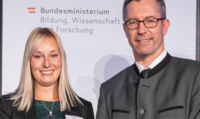
IAIK Doctoral student Barbara Gigerl receives Award for Outstanding Master's Thesis
13 December 2019
The Federal Ministry of Education, Science and Research (BMBWF) annually honours the best 50 (out of 16.000!) Austrian Master's theses with a "Würdigungspreis/Staatspreis". This year, IAIK doctoral student Barbara Gigerl received the award for her thesis "Automated Analysis of Speculation Windows in Spectre Attacks". The main focus of the thesis is the analysis and extension of speculation windows in Spectre attacks, executed by CPUs of four different vendors.
Congratulations!
IV-Steiermark and TU Graz support IT talents from Southeast Europe
12 December 2019
As part of the talent promotion program ITalent South East, the Federation of Austrian Industries Styria and Graz University of Technology are again awarding scholarships to five young IT talents from Southeast Europe.
Plundervolt: New Intel security gap found with help of TU Graz
10 December 2019
A team of researchers from the University of Birmingham, KU Leuven and TU Graz (Daniel Gruss) have found a security gap in high-security SGX enclaves that exploits undervolting.
Master student Christian Gaisl receives WKO Grant
06 December 2019
IAIK master student Christian Gaisl receives the WKO Forschungsstipendium 2019/20! The presentation of awards will take place on 4th of December 2019. The WKO Steiermark annually awards 20 students, who are honoured with a grant of €2.100 for the development of economically oriented master theses. Congratulations!
Dieter Schmalstieg receives Research Award of the Federal State of Styria
29 November 2019
Dieter Schmalstieg and his team of the Institute of Computer Graphics and Vision have developed a novel method combining the advantages of Cloud Computing and Virtual Reality called "Shading Atlas Streaming". For this and his research in general, he received the "Forschungspreis des Landes Steiermark". Congratulations!
Peter Pessl receives BMBWF Award of Excellence 2019
26 November 2019
The Federal Ministry of Education, Science and Research (BMBWF) anually honors outstanding Austrian dissertations with the Award of Excellence. This year, IAIK Postdoc Peter Pessl, who finished his doctoral studies "sub auspiciis", received this prestigous award for his thesis 'Side-Channel Attacks on Lattice-Based Cryptography and Multi-Processor Systems'. In his work, he expands side-channel attacks, which exploit that physical properties of an electronic device depend on processed secrets, to new fields. Concretely, he proposed new attacks on lattice-based cryptography - a new type of cryptographic algorithms secure against attacks by future quantum computers. Congratulations!
Johanna Pirker wins futurezone Award 2019
21 November 2019
On 21 November, the winners of the futurezone Award 2019 were selected at a gala ceremony held at the First Campus in Vienna. TU Graz computer scientist Johanna Pirker wins in the category "Women in Tech"! Congratulations!
New Information Security Scholarship
15 November 2019
The Cybersecurity Campus Graz is awarding scholarships for talented and motivated international students starting their studies at TU Graz in winter semester 2020/21.
The scholarships are intended for students with a major in information security within the english-language master’s degree programmes in Computer Science, Information and Computer Engineering or Software Engineering and Management.
Apply until 15 January 2020!
more
New professor, new institute: Leila Taher, Institute of Biomedical Informatics
13 November 2019
On November 1st, Bioinformatician Leila Taher was appointed university professor at our Faculty and heads the newly founded Institute for Biomedical Informatics. Born in Argentina, Taher wants to motivate: "Anyone who wants to can learn programming." A very warm welcome to Graz University of Technology!
more
ZombieLoad 2.0 – New variant of old attack
13 November 2019
At the beginning of 2019, an international research team led by Daniel Gruss, Michael Schwarz and Moritz Lipp of IAIK discovered the processor loophole ZombieLoad. Since then there has been a software patch and new processors. But with a new variant of the old attack these are no longer safe either - install updates!
more
Graz universities celebrate their flashes of genius
12 November 2019
Since 2015, the Medical University of Graz, TU Graz and the University of Graz have been honouring particularly "inventive" researchers in a joint ceremony every two years. 260 scientists, amongst them six members of our Faculty, were invited to the third occasion of this award, whose inventive talent produced no less than 169 invention disclosures and 71 patent applications between July 2017 and June 2019. Congratulations to Christian Baumgartner, Gerhard Holzapfel, Friedrich Fraundorfer, Hermann Scharfetter, Jörg Schröttner and Dieter Schmalstieg!
THE World University Rankings 2020: TU Graz moves up from 176-200 to 151-175!
21 October 2019
The Times Higher Education World University Rankings 2020 includes almost 1,400 universities across 92 countries, standing as the largest and most diverse university rankings ever to date.
We are happy to announce that we have been ranked 151-175 in the computer science category, up from 176-200! Sincere thanks and congratulations to all our outstanding scientists who make such a great achievement possible through their daily dedication!
more
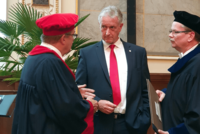
Honorary Doctorate for Prof. Dieter W. Fellner
07 October 2019
On 30 September 2019, Prof. Dieter W. Fellner was awarded the honorary title of Doctor Engineer by the University of Rostock.
more
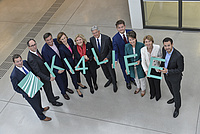
Founding of the Fraunhofer Austria Innovation Center "KI4LIFE" in Klagenfurt
02 October 2019
Alliance of business representatives, companies and research institutions will support Carinthian companies in digitalisation and the central future topic of artificial intelligence.
more
Graz becomes capital of digital game development
28 August 2019
What do games such as "The Settlers", "Fallout: New Vegas" and "Frostpunk" have in common? Their developers have been invited by Game Development Graz and TU Graz to give talks at the Game Dev Days Graz from 6 to 8 September.
more
New project proposal of TU Graz with MIT and UC Berkeley
20 August 2019
Together with the App Inventor team at the MIT, the Snap! team at UC Berkeley, and the Play Learn Foundation India, Wolfgang Slany and his team submitted a proposal for a huge grant, i.e., money that we will spend on developing Catrobat / Pocket Code. If they get it, the Catrobat project will have a budget of 5 million US$, per year, for 5 years!
Their vision: "We help eradicate poverty, starting in India. A sustainable prosperity depends on an economy of innovation, which in turn depends on creativity and technical skills. Smartphones with Internet enable even young people to sell apps to a worldwide market."
Please support the project by watching the video on YouTube!
Vice World Championship for RoboCup-Team of TU Graz
16 July 2019
Another success story for a student team of Graz University of Technology: The RoboCup team GRIPS wins the vice world champion title of the league "Logistics" at the Robotics World Championship RoboCup 2019 in Sydney.
more
Go International: Students from Russia and our Faculty Participated in a Joint Project Marathon
15 July 2019
The International Student Project Marathon is not too well-known yet but extremely promising and quite unique in many ways. Its goal is to unite young scientists from different countries, develop student exchanges and get new research results. Eleven graduate and postgraduate students from the SPbPU ICST and the Faculty of Computer Science and Biomedical Engineering TU Graz, along with teachers from Russia and Austria, took part in the joint marathon.
more
Forum für Technik und Gesellschaft awards sponsorship prize for theses with special social relevance
09 July 2019
Among the seven recipients of the prize are four members of our faculty: Maria Eichlseder, Angela Promitzer, Gerald Palfinger and Bernadette Spieler. Congratulations to all winners!
more (in German)
Maria Eichlseder and Peter Peßl of IAIK receive doctorate with highest presidential honours
01 July 2019
They have completed their schooling, studies and doctorate with excellent results only: After this top performance, Maria Eichlseder and Peter Peßl received their doctorates on June 27th in the ceremony hall of the Alte Technik "sub auspiciis Praesidentis rei publicae". The presence of Federal President Alexander Van der Bellen at the doctoral ceremony is an honour for all those who have gone down this path of excellence. At the doctoral ceremony, the candidates also received the ring of honour with the federal eagle from the President of the Republic of Austria.
more (in German)
Johanna Pirker and Gernot Müller-Putz win "Steirischer Wissenschaftspreis 2019"
11 June 2019
The prestigious prize was awarded for their work "Maroon - Immersive und motivierende Formen von virtuellem Lernen" and "MoreGrasp: Funktionswiederherstellung der oberen Extremität bei Personen mit hoher Rückenmarkverletzung mit Hilfe multimodaler Neuroprothesen zur Interaktion im täglichen Leben", respectively. Read more on apa or Land Steiermark.
Merit Scholarship and Scholarship Grant by our Faculty for 2018/19 now available.
29 May 2019
Merit Scholarship call in DE / EN.
Scholarship Grant call in DE / EN.
"We Build a City" on AirCampus Graz
29 May 2019
To make technology accessible and tangible: This is the aim of the "Maker Days for Kids" project. Graz University of Technology and the non-profit association BIMS e.V. offer children and young people the opportunity to work creatively in an open workshop in summer. A podcast by Eva Szabo.
Intelligent pedestrian traffic lights: New system by ICG's Horst Possegger automatically recognises pedestrians' intent to cross the road
27 May 2019
The innovative camera system recognises pedestrians’ intention to cross the road and changes automatically to green. This reduces unpleasant waiting times and allows better flow of motorised urban traffic.
More on tugraz.at
New curricula for Bachelor programmes Computer Science, Software Engineering and Management and Information and Computer Engineering
21 May 2019
The new curricula were approved by the Senate of TU Graz on 06 May 2019. You can find the official documents here.
A lot has changed in the new plans. The Basisgruppe Information and Computer Engineering has compiled a comprehensive overview and summary here.
After Meltdown and Spectre: Researchers at our Faculty discover new security flaws
15 May 2019
ZombieLoad and store-to-leak forwarding are the names of the new exploits which have just been announced by TU Graz security researchers Daniel Gruss, Moritz Lipp, Michael Schwarz and an international team. The three computer scientists were together with TU Graz Professor Stefan Mangard part of the team which discovered the serious security flaws Meltdown and Spectre last year.
More on tugraz.at
Try it out yourself here.
New Faculty Newsletter
09 April 2019
We are happy to announce our new service - the CSBME Newsletter! Starting today, you will receive the latest events, news, jobs and doctoral examinations conveniently in your inbox every week.
Do you want something published in the newsletter? Use this form and send an e-mail to newsletter.csbme@tugraz.at!
You can find all published newsletters in the archive.
The Consequences of Progress on AirCampus Graz
01 April 2019
What are the long-term effects of technical innovation? The team of Science, Technology and Society Unit (STS) around Günter Getzinger strives to foster sensitivity for possible consequences of progress and sheds light on interactions between science and society. A podcast by Roland Grohs.
TU Graz sets international standards in cryptography
27.02.2019
Spread over five years, the CAESAR competition focused on encryption processes for digital information. Now the jury has selected TU Graz’s ASCON algorithm as a means of secure encryption for the internet of things.
Multi-million euro investment in IT security: SGS and TU Graz set up Cybersecurity Campus Graz
11.02.2019
A unique IT security research, education, testing and certification hub is taking shape in Styria, Austria: Cybersecurity Campus Graz. The centrepiece is a new joint research centre and a cybersecurity testing and certification laboratory operated by the SGS Group. Around 400 people will work and perform research there when it enters full operation.
Dean's List 2018
01.02.2019
The Dean's List 2018 with the top 5% students of our Department is now online. We want to congratulate our excellent students for their achievements and persistance, keep up the good work!
Researchers Lay Foundation for Smart Contrast Medium
13.12.2018
Under the leadership of TU Graz, namely Stefan Spirk, Andreas Petrovic and Hermann Scharfetter, an international research team has developed a contrast medium concept for MRI, promising unprecedented features in medical imaging.
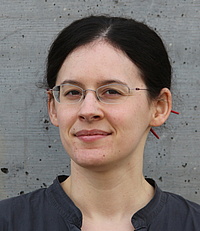
Maria Eichlseder presented with Award of Excellence for her outstanding dissertation
07.12.2018
With her thesis 'Differential Cryptanalysis of Symmetric Primitives', Maria Eichlseder from the Institute of Applied Information Processing and Communication Technology (IAIK) not only received the prestigious Austrian Award of Excellence, but is now also the first woman at TU Graz to earn her PhD sub auspiciis. Congratulations!
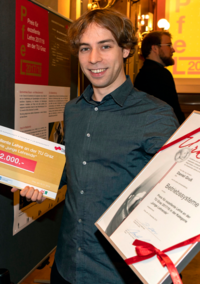
Daniel Gruss wins Prize for Excellence in Teaching 2017/2018
16.11.2018
Daniel Gruss from the Institute of Applied Information Processing and Communication Technology (IAIK) supports students' motivation in his course 'Operating Systems' using gamification. Now he was awarded the Prize for Excellence in Teaching in the category 'Young Teacher' alongside Carlo Alberto Boano and Patrick Wurm. Congratulations!
Tweets
Durch laden des Tweeds werden ihre Daten an Twitter übermittlet. Es gelten die Datenschutzbestimmungen von Twitter.

